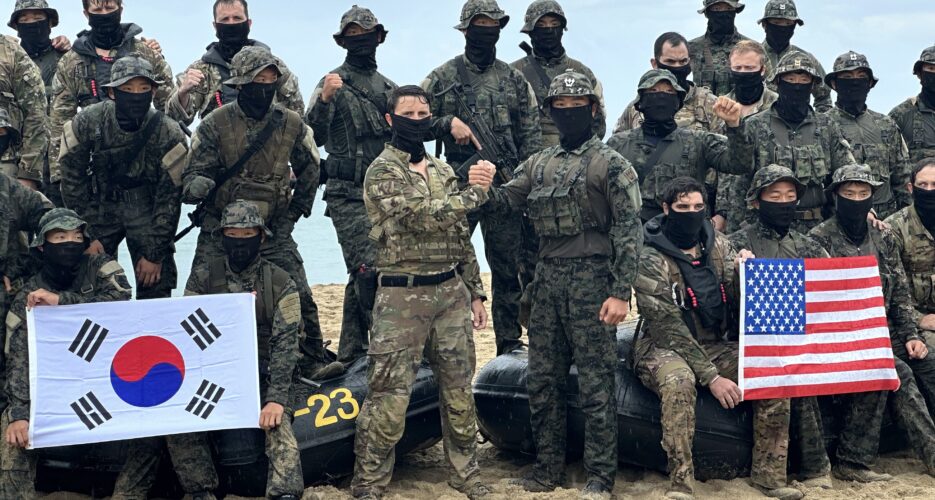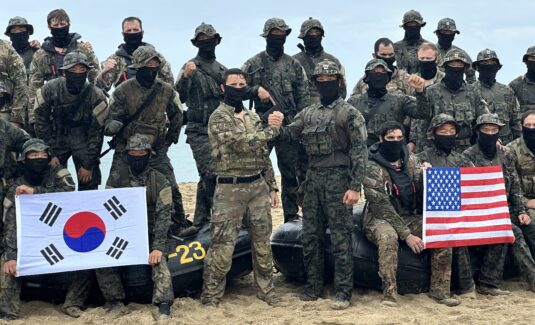beijingwalker
ELITE MEMBER

- Joined
- Nov 4, 2011
- Messages
- 65,191
- Reaction score
- -55
- Country
- Location
Ukraine war drives drop in US support for defending Seoul from North Korea: Poll
Survey finds only half of public favors using US troops to repel DPRK attack, blaming partisan split on aid to KyivAnton Sokolin October 6, 2023

U.S. and ROK soldiers during maritime infiltration drills on South Korea’s east coast in Aug. 2023 | Image: NK News
U.S. public support for defending South Korea against North Korean attack has slipped for the second year in a row, a new poll showed, amid partisan disagreement over whether to continue to back Ukraine in its fight against Russian aggression.
Only 50% of U.S. citizens favor using American troops to fight against the DPRK if it launches an invasion of the South, the 2023 Chicago Council survey conducted by market research firm Ipsos showed Thursday.
On the other side, 49% of the 3,242 U.S. adults who took part in the survey between Sept. 7 and 18 oppose helping South Korea to fend off the North.
American public support for military action on the Korean Peninsula reached 63% in 2021, dwindled to 55% last year and fell to 50% this year, according to the report.
The Chicago Council attributed the decrease in support for U.S. allies to “partisanship” and rivalry between Democrats and Republicans, with the latter increasingly vocal about opposing the provision of military aid to Kyiv and supporting South Korea in a hypothetical conflict with the North.
“Today, a narrow majority of Republicans oppose involving U.S. troops in such a conflict (53%, 46% favor), a decline of 22 percentage points,” the survey states. “Democrats (57%) continue to support defending South Korea.”
The poll notes that “large majorities” of both Republicans and Democrats “favored U.S. troops to defend South Korea from invasion by North Korea” in 2021. By contrast, “narrow majorities” of GOP supporters now oppose the idea of engaging in conflicts in both Europe and South Korea, it adds.
In contrast, the majority of survey participants welcomed using U.S. forces to help their European allies — Germany and the Baltic states — if Russia were to attack them.
The majority of Americans voiced support for U.S. military bases abroad, while favoring a presence in Europe more than Asia.
According to the survey, 64% of respondents back the idea of having U.S. military bases in South Korea, a drop from 72% in 2022. Similarly, the U.S. public support for bases in Japan declined to 63% this year from 67% last year.
Go Myung-hyun, analyst at Asan Institute for Policy Studies, told NK News that U.S. politics has become overwhelmingly “bipolar during [the] Obama-Trump-Biden era,” with “‘Anything But Biden’ sentiment” becoming increasingly popular.
He also said that “Republicans [would be] reluctant to help South Korea in case of war,” pointing to their “Eurocentrism” and former–President Donald Trump’s past efforts to withdraw U.S. forces from the Korean Peninsula.
The expert stated that Trump’s possible reelection remains a concern as he “would trash the existing trilateral cooperation” between the U.S., ROK and Japan and undermine the Washington Declaration, under which the U.S. and South Korea sought to boost nuclear deterrence against the North.
Speaking on how the partisanship might affect Ukraine, Go said Trump would likely “cut the Ukrainian support if the war [was] to continue” unless he could extract economic gains out of the conflict.
The Chicago Council report suggests that the war in Ukraine has likely “highlighted the costs to the United States of coming to the aid of U.S. allies,” while the domestic debate over Ukraine appears to influence the discourse about “U.S. involvement in international conflicts.”
It concludes that “partisan divisions may continue and potentially grow as the war in Ukraine continues.”

Ukraine war drives drop in US support for defending Seoul from North Korea: Poll | NK News
U.S. public support for defending South Korea against North Korean attack has slipped for the second year in a row, a new poll showed, amid partisan disagreement over whether to continue to back Ukraine in its fight against Russian aggression. Only 50% of U.S. citizens favor using American...
